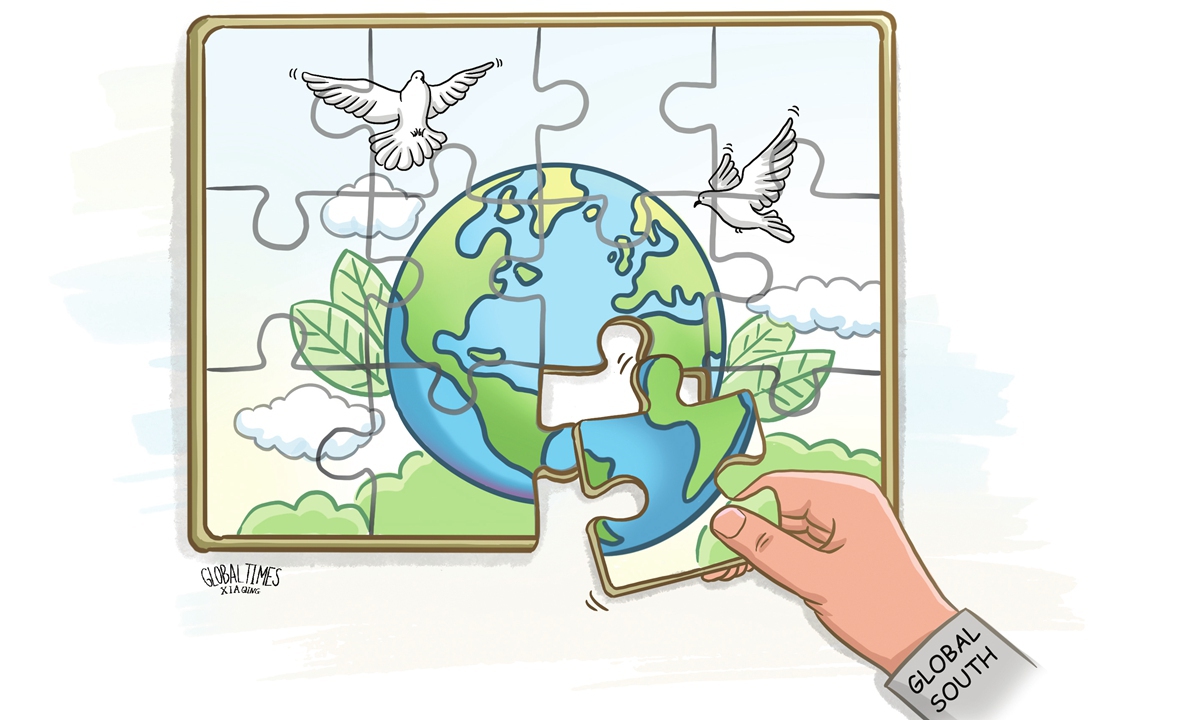
Illustration: Xia Qing/GT
In less than a month,
mk the world has been swept up in a whirlwind of diplomatic activities, with the BRICS summit, APEC 2024, and the G20 summit all taking place in quick succession. These multilateral institutions are indicative of the shifting sands of global aspirations and priorities among members.
The aspirations of the global majority - sometimes euphemistically called the Global South - have featured strongly in all these meetings. Ongoing cross-border economic collaboration by way of intensified trade and investment flows is a common theme among the global majority. The ability to pursue such relationships, without fear of being sanctioned or punished by historically dominant Western powers, featured strongly at the BRICS meeting in Kazan. There, participants agreed to strengthen trade and financial settlement in local currencies, study feasibility of an independent cross-border settlement and depositary infrastructure.
BRICS nations seek mechanisms to pursue national economic development free from the pernicious financial architecture of the post-World War II Bretton Woods institutional set-up.
In particular, the focus on the use of local currencies in financial transactions between BRICS countries and their trading partners, as well as the feasibility of establishment of an independent cross-border settlement are central to this focus.
The recently concluded APEC Economic Leaders' Meeting in Lima reinforced a widespread commitment from participants to open trade as a foundation of economic development among nations. This has been a cornerstone of APEC from its very beginning, and most participants remain committed to the pursuit of open trade. "We acknowledge the importance of, and will continue to work to deliver a free, open, fair, nondiscriminatory, transparent, inclusive and predictable trade and investment environment," the leaders of the 21-member APEC said in a statement adopted at the end of their two-day summit in Lima, Peru.
Americans have signalled a reluctance on this front. As nations of the global majority are seeking expanded trade and non-discriminatory interconnectedness, the US appears to be drawing away from such commitments. Over the years, the US has systematically blocked the appointment of new Appellate Body members and judges and de facto impeded the work of the WTO appeal mechanism. The weaponization of the US dollar and SWIFT messaging system has further undermined the dependability of post-World War II cross-border institutions. The threat of the expansion of tariffs raises further questions about the extent to which the US is committed to open multilateralism.
As for the G20, the host nation, Brazil, has long declared a three-point agenda, namely combating hunger, poverty and inequality; focusing on three dimensions of sustainable development (economic, social, and environmental); and the reform of global governance. These topics have been chosen keeping the objective of reducing inequalities at the heart of the reform effort as is reflected in the motto of the Brazilian presidency, "Building a Just World and a Sustainable Planet."
In their own ways, developing countries in BRICS, APEC and G20 are making it clear that the majority of nations seek institutions and approaches that can facilitate greater collaboration and coordination in the name of economic development and shared prosperity. They also recognise that many of the challenges today transcend national boundaries, and require collective action.
Whether the US plays a constructive role in the pursuit of these ambitions or not is ultimately a matter for the US. Meanwhile, the rest of the world looks like they are moving on.
The author is an adjunct professor at Queensland University of Technology, a senior fellow at Taihe Institute and a former advisor to Kevin Rudd, former Australian prime minister. opinion@globaltimes.com.cn

